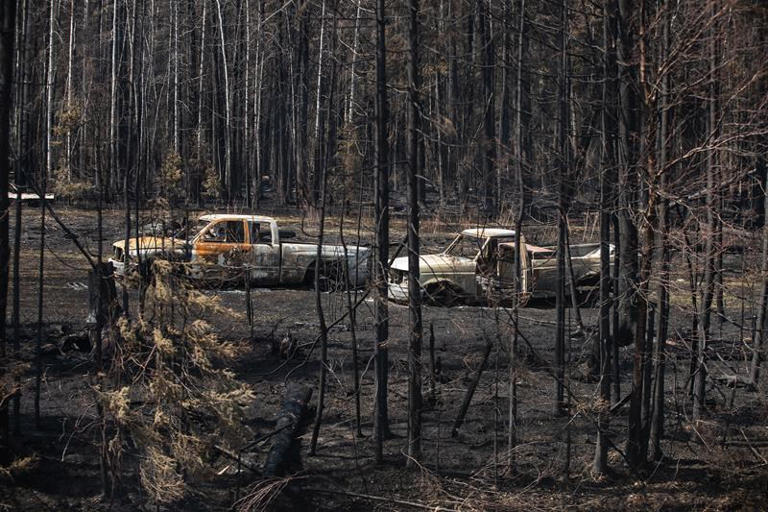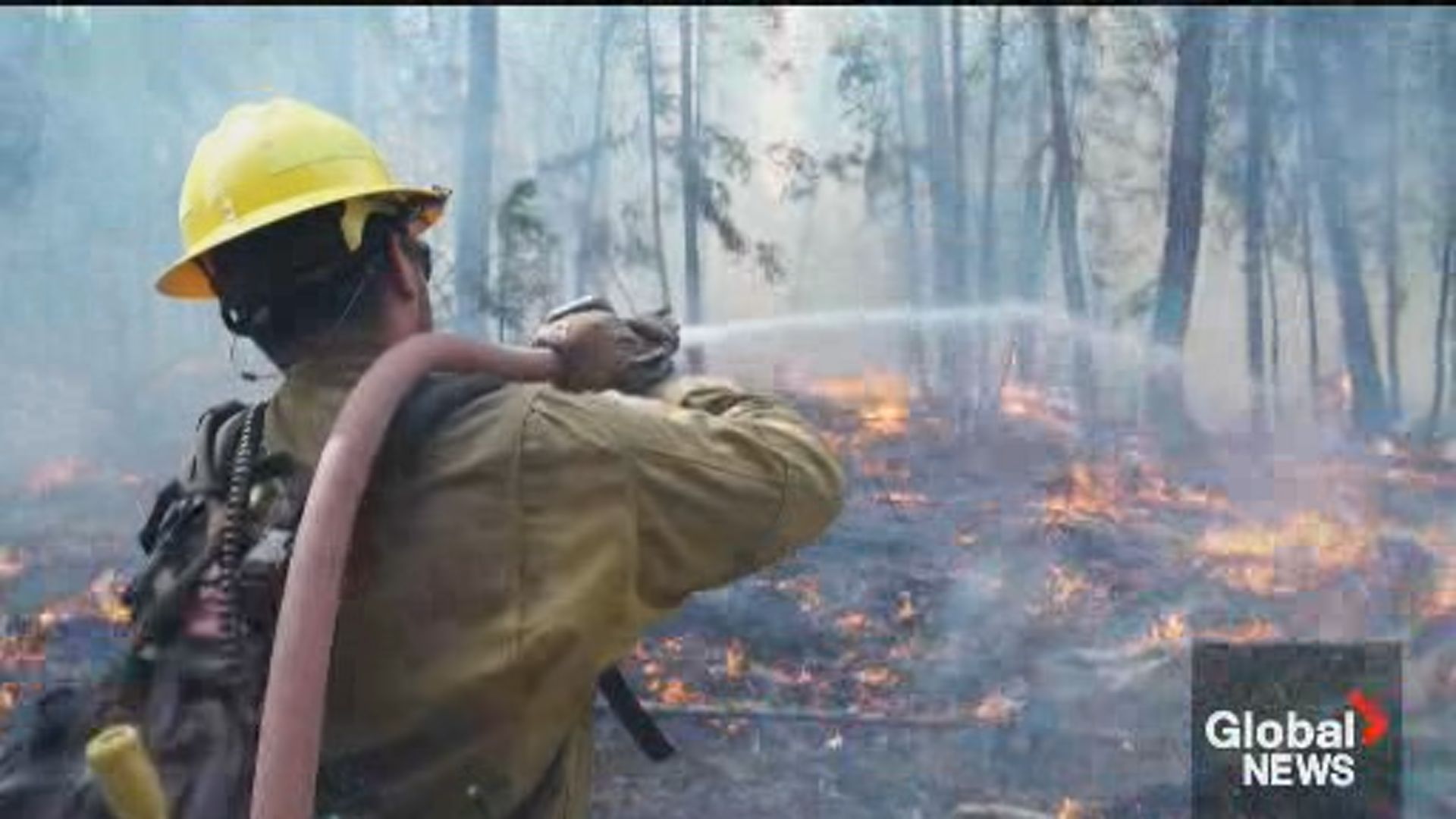ABC NewsHarvard president resigns over plagiarism allegations
Claudine Gay has resigned from her seat as Harvard University's president after a tenure mired by controversy and skepticism, with several forces at play in her exit from the prestigious position at the Ivy League school.
Gay, who will continue to work as a professor at the university, faced a heated congressional hearing about antisemitism in higher education, allegations of plagiarism, as well as a conservative campaign designed to eliminate what it calls the bureaucracy of diversity, equity and inclusion (DEI).
Gay as a symbol for DEI in higher ed
Gay entered her role at a tumultuous time. Harvard was under a spotlight for its affirmative action policy that allowed race to be used as one factor in its admissions processes, aimed at addressing racial inequities in access to higher education.
She officially took over the position in July 2023 just days after the Supreme Court set limits on affirmative action at the university. The decision came amid conservative attacks on diversity initiatives -- or DEI -- in higher education.MORE: DEI: What does it mean and what is its purpose?
DEI initiatives are intended to remedy policies that may exclude historically marginalized groups. This includes addressing pay inequity, rectifying issues that lead to poor retention rates among marginalized groups, or implementing anti-discrimination trainings.
Attacks on DEI initiatives in education have intensified in recent years, with legislation restricting race-related curriculum and conversation in workplaces, schools and colleges or shunning DEI-related activities and offices from campuses.
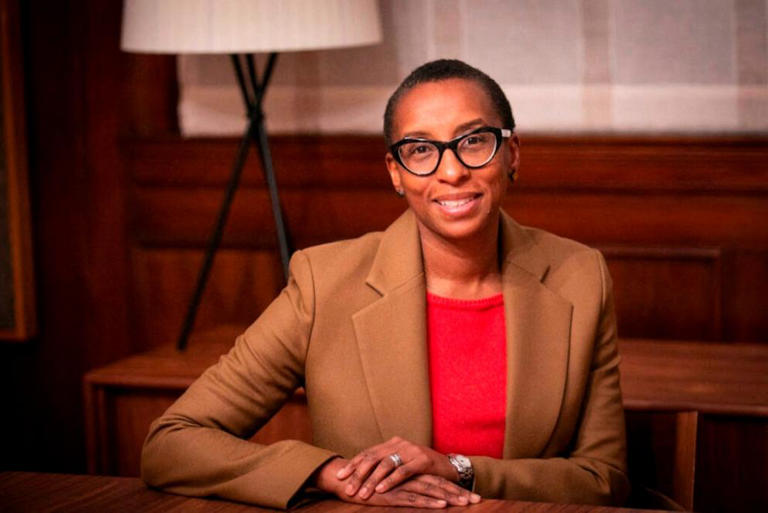
Claudine Gay poses for a portrait, in an image released by Harvard University, Dec. 14, 2022.© Stephanie Mitchell/Harvard University/AFP via Getty
Conservative figures who called for Gay's downfall -- including conservative anti-DEI advocate Christopher Rufo, who publicized allegations of plagiarism and antisemitism against Gay -- celebrated her resignation as a win against DEI.
"This is the beginning of the end for DEI in America's institutions," said Rufo in a social media post. "We will expose you. We will outmaneuver you. And we will not stop fighting until we have restored colorblind equality in our great nation."
Some DEI detractors, including hedge fund billionaire and Harvard alumn Bill Ackman, in a social media post, claimed Gay was unqualified for the position and that DEI played a role in her selection as president. Gay previously led Harvard's largest division, the Faculty of Arts and Sciences, as dean and has been a professor at both Harvard and Stanford.
Gay addressed these critiques in a New York Times op-ed about her resignation.
"The campaign against me was about more than one university and one leader," said Gay. "This was merely a single skirmish in a broader war to unravel public faith in pillars of American society. Campaigns of this kind often start with attacks on education and expertise, because these are the tools that best equip communities to see through propaganda."
She continued, "It is not lost on me that I make an ideal canvas for projecting every anxiety about the generational and demographic changes unfolding on American campuses: a Black woman selected to lead a storied institution."
Claudine Gay was the first person of color and second woman in Harvard University's 386-year history to serve as president.
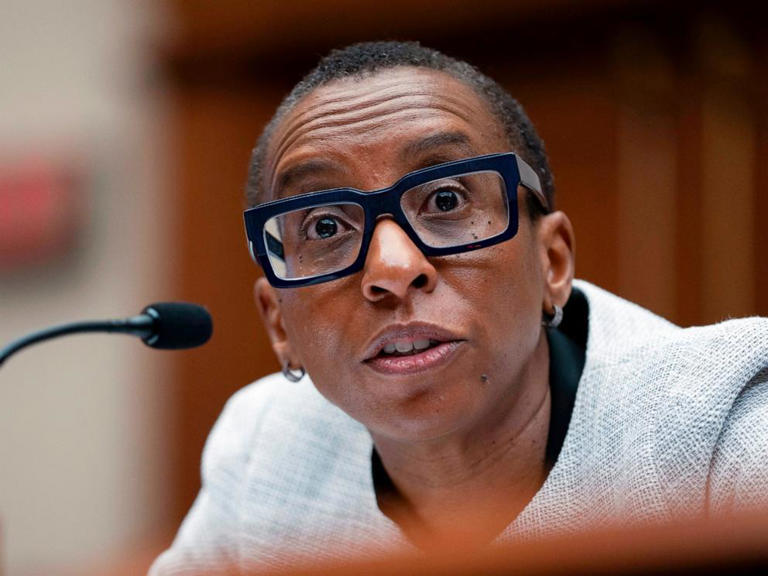
Harvard University President Claudine Gay speaks during a hearing of the House Committee on Education on Capitol Hill, Dec. 5, 2023, in Washington.© Mark Schiefelbein/AP
The combative congressional hearing
Gay testified before Congress in early December 2023 alongside the University of Pennsylvania's then-President Liz Magill and the Massachusetts Institute of Technology President Sally Kornbluth about how they were handling antisemitism on their respective campuses in the wake of the Oct. 7 Hamas attack on Israel.
Both Harvard and the University of Pennsylvania are among the schools being investigated by the U.S. Department of Education for complaints of discrimination under Title VI.
A tense exchange between Gay and New York Republican Rep. Elise Stefanik became a focal point for criticism.
Stefanik had asked Gay whether "calling for the genocide of Jews" violates Harvard's code of conduct.
Gay responded, "The rules around bullying and harassment are quite specific and if the context in which that language is used amounts to bullying and harassment, then we take -- we take action against it."
Stefanik -- a Harvard alumna -- also pressed Gay on whether admissions offers would be rescinded or any disciplinary action would be taken against students or applicants who say "from the river to the sea" or "intifada."MORE: A timeline of Harvard President Claudine Gay's short, scandal-plagued tenure
The decadesold phrases have been used as a rallying cry for Palestinian rights and freedom by supporters worldwide, and are also considered by others offensive code for wiping Israel off the map, between the Jordan River and the Mediterranean Sea, as Hamas has vowed to do.
Several members of the House have called for expulsions, firings and disciplinary action on campuses amid pro-Palestinian protests where students have used such rhetoric.
Gay said generally that “actions have been taken” regarding the use of these phrases, but also defended Harvard’s policy to allow all speech -- whether she agrees with it or not -- until it crosses a line into bullying, harassment or intimidation.
"We do not sanction individuals for their political views or their speech. When that speech crosses into conduct that violates our behavior-based policies, bullying, harassment and intimidation, we take action," Gay said at the hearing.
Her comments -- and those of her peers -- were criticized by some, including White House spokesman Andrew Bates.
"It's unbelievable that this needs to be said: calls for genocide are monstrous and antithetical to everything we represent as a country," Bates said in a statement.
"Any statements that advocate for the systematic murder of Jews are dangerous and revolting – and we should all stand firmly against them, on the side of human dignity and the most basic values that unite us as Americans."
Free speech experts told ABC News they believed the presidents' comments were fair.
"The presidents' analysis, legally speaking, was correct. That, indeed, there are lots of questions that can't be answered yes or no," said Eugene Volokh, a professor of law at the University of California, Los Angeles, told ABC News in a past interview.
He continued, "They're under oath, they're supposed to tell the truth. And the truth is that advocacy of genocide is sometimes protected under the First Amendment and sometimes not."
Several legislators, including Stefanik, called for her resignation. The university's main governing board issued a statement unanimously affirming its support for Gay in spite of these calls.
"Our extensive deliberations affirm our confidence that President Gay is the right leader to help our community heal and to address the very serious societal issues we are facing," the Harvard Corporation said in a statement.
Gay elaborated on her comments in a later statement, saying: "There are some who have confused a right to free expression with the idea that Harvard will condone calls for violence against Jewish students."
"Calls for violence or genocide against the Jewish community, or any religious or ethnic group, are vile, they have no place at Harvard," she said, adding, "Those who threaten our Jewish students will be held to account."
In the New York Times op-ed, she said she "fell into a well-laid trap" and made a mistake in failing "to clearly articulate that calls for the genocide of Jewish people are abhorrent and unacceptable and that I would use every tool at my disposal to protect students from that kind of hate."

Claudine Gay addresses an audience during commencement ceremonies, May 25, 2023, on the school's campus in Cambridge, Mass.© Steven Senne/AP
Accusations of plagiarism
Washington Free Beacon, a conservative political news outlet, initially published accusations that Gay "paraphrased or quoted nearly 20 authors ... without proper attribution."
The Harvard Corporation responded in a Dec. 12 statement that Gay requested an independent review of her published work in light of the allegations. The results revealed a few instances of "inadequate citation" but "no violation of Harvard's standards of research misconduct," the statement read.
The corporation announced that Gay would be requesting four corrections in two articles to insert citations and quotation marks that were not present in the original text. However, the corporation initially affirmed its support for Gay amid the allegations in the statement.
"Our extensive deliberations affirm our confidence that President Gay is the right leader to help our community heal and to address the very serious societal issues we are facing," the statement read.
Washington Free Beacon, Rufo and other conservatives continued to raise concerns and accusations. The Washington Free Beacon interviewed several authors who critics say Gay allegedly plagiarized, who responded that they were not concerned about the claims or do not believe the passages in question are "academic plagiarism."
Harvard's “Interim Policy and Procedures for Responding to Allegations of Research Misconduct” defines research misconduct as a "fabrication, falsification, or plagiarism in proposing, performing, or reviewing research, or in reporting research results. ... Research misconduct does not include honest error or differences of opinion."
Harvard's webpage on "Harvard University Plagiarism Policy" tells students: "When you fail to cite your sources, or when you cite them inadequately, you are plagiarizing, which is taken extremely seriously at Harvard."
It continues, "Students who, for whatever reason, submit work either not their own or without clear attribution to its sources will be subject to disciplinary action, up to and including requirement to withdraw from the College."
Gay said in the New York Times op-ed that she stands by her work.
"I have never misrepresented my research findings, nor have I ever claimed credit for the research of others," said Gay.
She continued, "Despite the obsessive scrutiny of my peer-reviewed writings, few have commented on the substance of my scholarship, which focuses on the significance of minority office holding in American politics. My research marshaled concrete evidence to show that when historically marginalized communities gain a meaningful voice in the halls of power, it signals an open door where before many saw only barriers. And that, in turn, strengthens our democracy."
The Harvard community is reeling following the controversy, according to a collection of op-eds and articles on the fallout in the Harvard Crimson following Gay's exit. These stories detail concerns over the future of academic integrity, free expression and racial politics on campus. This includes questions about how much external influences will impact the Harvard campus moving forward in light of the forces seen in Gay's resignation.
“We need bold and imaginative solutions, but we can’t have those conversations on a college campus if we’re catering to the whims of people who have very clear ideological agendas,” one student told the student newspaper. “They’re trying to go viral, and they’re trying to take over Harvard from outside Harvard.”
Others told the student newspaper that they thought the resignation could help repair the university's image.
“I, along with many other Harvard students, look forward to the next president working to repair the university’s image and combat the hateful antisemitism and bigotry we have seen on our campus,” another student told the paper.
ABC News' Cheyenne Haslett contributed to this report.
Claudine Gay says exit from Harvard University rooted in 'lies and insults
Former president of elite American university says she was targeted by "recycled racial stereotypes" about Black talent, following her response to pro-Palestine demonstrations on campus, which was dubbed as "anti-Semitism" by American right-wingers.
Harvard President’s Resignation Part of Larger War on Education, Professor Says
We’re witnessing a campaign to destroy the U.S.’s capacity to address its past and present, says Khalil Gibran Muhammad.
One Billionaire Made It His Mission to Oust Harvard’s President. He Had Ulterior Motives.
Harvard's First Black President Terrifies Billionaire Bill Ackman
Harvard board backs university president amid anti-Semitism criticism
Harvard names new president, first Black woman to hold top job
Brandon Tensley
Thu, January 4, 2024
Claudine Gay’s announcement on Tuesday that she was stepping down from her position as the president of Harvard University was, for many people, a gut punch.
“It’s discouraging for young students to see this because the world is saying that we’re the future and we gotta be the ones to come up with the next ideas, but everywhere we look, Black people are being taken down. So it’s hard to really believe we can achieve that,” RuQuan Brown, a Black Harvard senior, told Capital B.
The decision came after a months-long conservative campaign designed not only to banish the school’s first Black president but to wipe out efforts to remedy racial inequality in major institutions, including higher education, business, and government.
“I’m deeply offended — as a member of the Harvard community and as a Black man,” Cornell William Brooks, a professor of the practice of public leadership and social justice at the Harvard Kennedy School, told Capital B. “I’m offended by the assault on Claudine Gay particularly, Black women generally, and Black people most broadly.”
Brooks isn’t the only one outraged by the debacle. The Rev. Al Sharpton’s civil rights organization, the National Action Network, intends to picket Thursday outside the office of Bill Ackman, a Harvard alumnus and billionaire hedge fund manager who helped lead the charge against Gay. Ackman had demanded Gay’s removal and impugned her on social media for supposedly being a diversity hire.
“President Gay’s resignation is about more than a person or a single incident. This is an attack on every Black woman in this country who’s put a crack in the glass ceiling,” Sharpton wrote in a statement. “If he doesn’t think Black Americans belong in the C-Suite, the Ivy League, or any other hallowed halls, we’ll make ourselves at home outside his office.”
Gay became president just last July, after a career as a political scientist and an academic administrator. In a letter to the Harvard community, she stressed her belief that her resignation is the best way for the school to move forward and regain some degree of normalcy.
Her tenure — the shortest in Harvard’s history — was plagued by controversy, first over her response to the Oct. 7 Hamas attack on Israel and then over plagiarism allegations marshaled by conservative activists. This was despite the fact that Gay enjoyed fierce support both from university leadership and from alumni.
“I’ve been called the N-word more times than I care to count,” Gay wrote in a Wednesday New York Times op-ed. “My hope is that by stepping down I will deny demagogues the opportunity to further weaponize my presidency in their campaign to undermine the ideals animating Harvard since its founding: excellence, openness, independence, truth.”
Here’s everything you need to know about Gay’s resignation — and the political forces that fueled it.
What’s going on, really?
The scrutiny that conservative activists directed at Gay wasn’t about rooting out plagiarism. Instead, it was about ousting someone whose tenure they viewed as a sop to diversity efforts and continuing the wider assault on elite institutions after the dismantling of affirmative action in higher education last June.
“This was an attack on her race and her gender, not on how she handled antisemitism on Harvard’s campus or on the rigor of her scholarship,” Brooks said. “And the reason we know this is because those who mounted the attack have admitted it.”
He pointed out that Gay’s critics spent more time talking about affirmative action and diversity, equity, and inclusion than they did with confronting the rise of antisemitism and hate more generally in this country.
Others echoed these sentiments.
Ibram X. Kendi, for instance, framed conservative actors’ tight focus on plagiarism as little more than a smoke screen meant to grant legitimacy to an unsavory cause: removing a Black person from power.
The question we ought to be asking, he said on X, “is whether all these people would have investigated, surveilled, harassed, written about, and attacked her in the same way if the Harvard president in this case would have been White.”
It’s hardly rocket science, Kendi added, to figure out why “a racist mob” is finding pleasure in Gay’s resignation — “saying ‘go woke, go broke’” — and insisting that the scholar and administrator was never qualified for the position in the first place.
What does Gay’s stepping down mean for academia and beyond?
Gay’s resignation has been particularly unsettling to scholars and racial justice organizers, who believe that the episode has opened the door to additional attempts to undermine Black representation in higher education.
Read: Texas’ College DEI Ban Is the Latest to ‘Turn Back the Clock on Racial Equality’
Diversity at the executive level of colleges and universities is rising. But it’s growing at a glacial pace, and it doesn’t accurately reflect the demographics of campuses, according to the 2023 American College President Study from the American Council on Education.
There’s also concern that the consequences of the attack on Gay could stretch beyond the campuses of elite institutions.
“I think that all of this is also about a kind of racial profiling in employment for rank-and-file Black folks,” Brooks said. “If we can weaponize race and gender with respect to the president of Harvard, what does that mean for Black people who are applying for entry-level jobs? What does that mean for new college graduates who are just entering the workforce?”
In other words, what happened is a real problem for everybody — not just for the elites.
Gay offered a similar warning in her New York Times op-ed, saying that she’s just one victim in a much greater war on the country’s governing institutions.
“Campaigns of this kind often start with attacks on education and expertise, because these are the tools that best equip communities to see through propaganda,” she wrote. “But such campaigns don’t end there. Trusted institutions of all types — from public health agencies to news organizations — will continue to fall victim to coordinated attempts to undermine their legitimacy and ruin their leaders’ credibility.”
What’s the timeline for the unraveling of Gay’s tenure?
The controversy around Gay brewed for months.
Oct. 7: After Hamas’ attack on Israel, a coalition of 34 Harvard student groups released a controversial statement in which they said that Israel is “entirely responsible for all unfolding violence” in the country. The organizations said that this violence “did not occur in a vacuum,” and they linked it to the ongoing conflict in Gaza. (Several groups later withdrew their signatures.)
Oct. 10: Gay denounced the “terrorist atrocities perpetrated by Hamas,” and said that student groups — including those that released the statement — don’t speak for the school or its leadership.
Dec. 5: Gay, along with her counterparts at the University of Pennsylvania and MIT, testified at a five-hour hearing of the U.S. House Committee on Education and the Workforce about antisemitism on their campuses. She condemned “hateful, reckless, offensive speech,” and underscored that it’s “abhorrent” to her. Many saw Gay’s response as timid, and she later apologized for not offering a clearer, more powerful rebuke of antisemitism.
Dec. 9: On X, Ackman posted a link to claims questioning the integrity of Gay’s academic work and arguing that she was a diversity hire.
Dec. 11: Black Harvard alumni circulate a petition to show their support of Gay. “I feel heartened by the fact that there are people who are standing up for common decency, civility, and respect, and understanding that issues are complex and difficult,” Sonji Jacobs, an alumna, told Capital B. “The only way we’re going to move forward as a college, nation, and world … is if we’re able to have conversations with each other.”
Dec. 12: The Harvard Corporation, one of the school’s governing boards, announced that Gay was keeping her job. “Our extensive deliberations affirm our confidence that President Gay is the right leader to help our community heal,” the board said in a statement. Further, of the plagiarism allegations, it explained that it had found “a few instances of inadequate citation” but no real violations of the school’s research standards and that Gay “is proactively requesting four corrections in two articles.”
Dec. 21: After the school further reviewed Gay’s political science work, a Harvard spokesperson said that she would correct newly discovered instances of “inadequate citation” in her doctoral dissertation.
Jan. 2: Gay announced that she was stepping down from her position, saying that she still has “a deep love for Harvard.”
Capital B staff writer Aallyah Wright contributed to this report.
The post Claudine Gay’s Resignation: What’s at Stake for Black People appeared first on Capital B News.
Claudine Gay pens op-ed describing racism after resigning in turmoil from Harvard University
Kelly Rissman
Thu, January 4, 2024
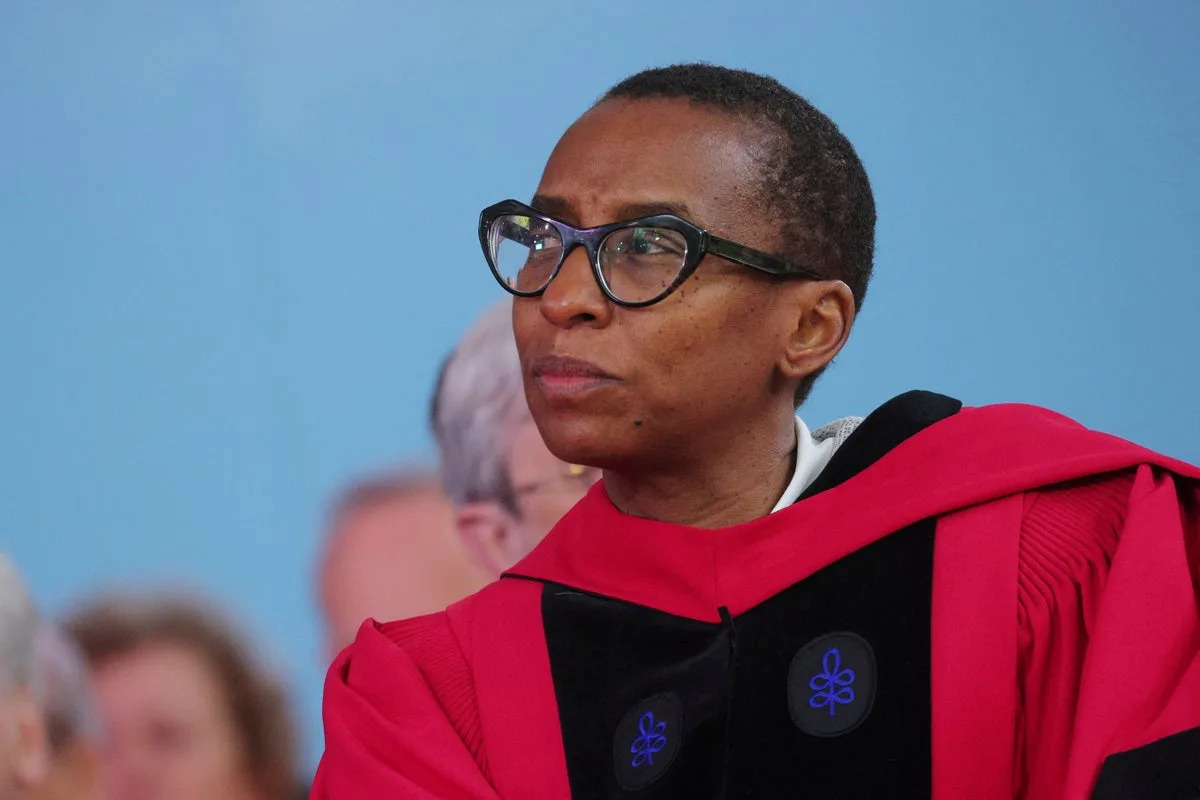
Claudine Gay pens op-ed describing racism after resigning in turmoil from Harvard University
Harvard’s outgoing president Claudine Gay voiced her response to the rollercoaster of accusations-turned-resignation in an opinion piece, highlighting the heightened racism she has encountered in recent weeks.
Ms Gay became Harvard’s first Black president in July 2023. But she made another first in the university’s history this week — the shortest tenure of any president — when she resigned after facing criticism about her response to anti-semitism following the Hamas attacks followed by new scrutiny into her scholarly work.
In the New York Times, Ms Gay wrote that the scandal that surrounded her is much larger than just her or Harvard. She described the rigmarole as “merely a single skirmish in a broader war to unravel public faith in pillars of American society.”
The scholar opined that “Campaigns of this kind often start with attacks on education and expertise, because these are the tools that best equip communities to see through propaganda.”
But after attacking educational behemoths, like Harvard, Ms Gay added that other “trusted institutions” like health agencies and news organisations are the next phase of this campaign, and will face “coordinated attempts to undermine their legitimacy.”
The former university president then admitted she had made “mistakes.” She tried to clarify her stance on the Israel-Hamas war, explaining that she had fallen into “a well-laid trap” when she made the now heavily criticised remarks at a Congressional hearing in November.
She defended her own writings following the recent discoveries of plagiarism in her dissertation. “When I learned of these errors, I promptly requested corrections from the journals in which the flagged articles were published, consistent with how I have seen similar faculty cases handled at Harvard,” Ms Gay penned.
She added that she has “never misrepresented my research findings, nor have I ever claimed credit for the research of others.”
Regardless of the fixation on her research, Ms Gay wrote, “few have commented on the substance of my scholarship, which focuses on the significance of minority office holding in American politics.”
Ms Gay then turned to “those who had relentlessly campaigned to oust me,” accusing them of using “recycled tired racial stereotypes about Black talent and temperament. They pushed a false narrative of indifference and incompetence.”
Ms Gay also noted that in recent weeks, her inbox has been flooded with hate-filled language and death threats. “I’ve been called the N-word more times than I care to count,” she wrote.
She wrote that as “a Black woman selected to lead a storied institution,” she made for “an ideal canvas for projecting every anxiety about the generational and demographic changes unfolding on American campuses.”
Ms Gay’s departure comes after calls for her resignation, following her catastrophic Congressional hearing, from more than 70 lawmakers as well as outspoken Harvard alum and billionaire hedge fund CEO Bill Ackman.
Mr Ackman previously suggested that Ms Gay was hired as part of the school’s diversity initiative. He doubled down on the issues with Harvard and its diversity, equity, and inclusion initiative in an X post spanning more than 4,000 words after Ms Gay stepped down.
Ms Gay will resume as a member of Harvard faculty, the university announced. Alan Garber, Provost and Chief Academic Officer, will serve as interim president.
TheGrio Staff
Thu, January 4, 2024
Gay’s resignation Tuesday, which marked the shortest tenure for a president at the Ivy League institution, followed weeks of criticism for plagiarism allegations and her handling of antisemitism on campus.
Prominent civil rights activists are rallying behind Claudine Gay following her resignation as president of Harvard University in what they believe is a racist attack on Black leaders, particularly women.
Politico reported that Gay, the first Black woman to lead the Ivy League institution, announced her resignation on Tuesday following weeks of criticism for plagiarism allegations and her handling of antisemitism on campus.
“Those who had relentlessly campaigned to oust me since the fall often trafficked in lies and ad hominem insults, not reasoned argument,” Gay wrote in the New York Times Wednesday. “They recycled tired racial stereotypes about Black talent and temperament. They pushed a false narrative of indifference and incompetence. My inbox has been flooded with invective, including death threats. I’ve been called the N-word more times than I care to count.”

Claudine Gay speaks during a hearing of the House Committee on Education on Capitol Hill last month. Gay, the first Black woman president of Harvard University, announced her resignation on Tuesday. (Photo by Mark Schiefelbein/AP, File)
Her resignation letter and a statement from Harvard’s governor board, which stood behind her presidency, said she faced “personal attacks and threats fueled by racial animus,” according to Politico.
“President Gay’s resignation is about more than a person or a single incident,” Rev. Al Sharpton said in a Tuesday statement. “This is an attack on every Black woman in this country who’s put a crack in the glass ceiling.”
Sharpton, who called the departure “an assault on the health, strength and future of diversity, equity and inclusion,” fired back at Harvard alum and billionaire hedge fund manager Bill Ackman, who was among Gay’s leading critics as he urged her to step down and implied that her race partially motivated her hiring.
“Most of all,” Sharpton opined, “this was the result of Bill Ackman’s relentless campaign against President Gay, not because of her leadership or credentials but because he felt she was a DEI hire.”
The civil rights activist, radio show host and MSNBC political analyst shared plans for his group, the National Action Network, to protest Thursday at Ackman’s New York headquarters.
Recommended Stories
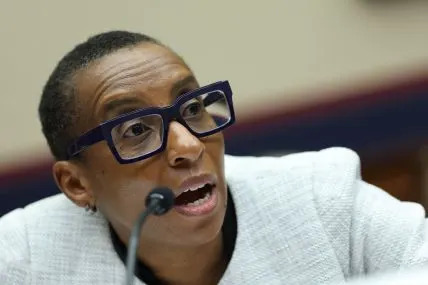
University Presidents Testify In House Hearing On Campus Antisemitism
Featured
When Dr. Claudine Gay was under attack, Black Harvard alumni rallied to save her job
Natasha S. Alford

Claudine Gay antisemitism hearing
News
Fox News host says Harvard’s Black president fails to address campus antisemitism
TheGrio Staff

Politics
Harvard president apologizes for remarks on antisemitism as pressure mounts on Penn’s president
Associated Press

News
St. Louis suburb scrutinized after 2014 shooting death of Michael Brown to pay $2.9M
Associated Press

Former Kentucky Attorney General Daniel Cameron
News
Daniel Cameron, who oversaw Breonna Taylor case, appointed CEO of anti-woke group
TheGrio Staff

Marla Frederick becomes first Black woman to lead Harvard
Featured
Marla Frederick becomes first Black woman to lead Harvard’s divinity school
TheGrio Staff
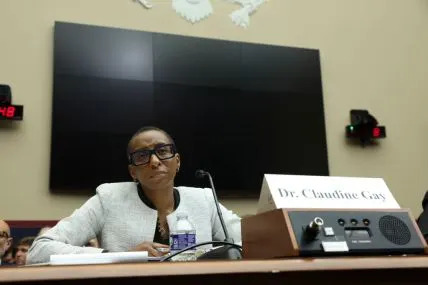
University Presidents Testify In House Hearing On Campus Antisemitism
Featured
Claudine Gay, white outrage and the myth of the ‘diversity hire’
Michael Harriot
“If he doesn’t think Black Americans belong in the C-Suite, the Ivy League, or any other hallowed halls,” said Sharpton, “we’ll make ourselves at home outside his office.”
Ackman consistently shared his disdain for Gay on his X account and penned an open letter to Harvard condemning her for not denouncing the October Hamas assault on Israel in her initial statement.
“President Gay resigned because she lost the confidence of the University at large due to her actions and inactions and other failures of leadership,” Ackman posted on X on Tuesday as he addressed backlash regarding his involvement in Gay’s resignation. “Gay resigned because it was untenable for her to remain President of Harvard due to her failings of leadership.”
Last month, Morehouse College President David Thomas criticized Ackman for remarks on X in which he stated that Harvard’s presidential search committee “would not consider a candidate who did not meet the DEI office’s criteria.”
“Mr. Ackman and others are right to call attention to issues of antisemitism at his alma mater where he attended as a Jewish student,” Thomas noted on LinkedIn, Politico reported. “To turn the question to the legitimacy of President Gay’s selection because she is a black woman is a dog whistle we have heard before: black and female, equal not qualified. We must call it out.”
Never miss a beat: Get our daily stories straight to your inbox with theGrio’s newsletter.
The post Activists see Claudine Gay’s resignation as Harvard president as a racist attack appeared first on TheGrio.
Char Adams
Thu, January 4, 2024
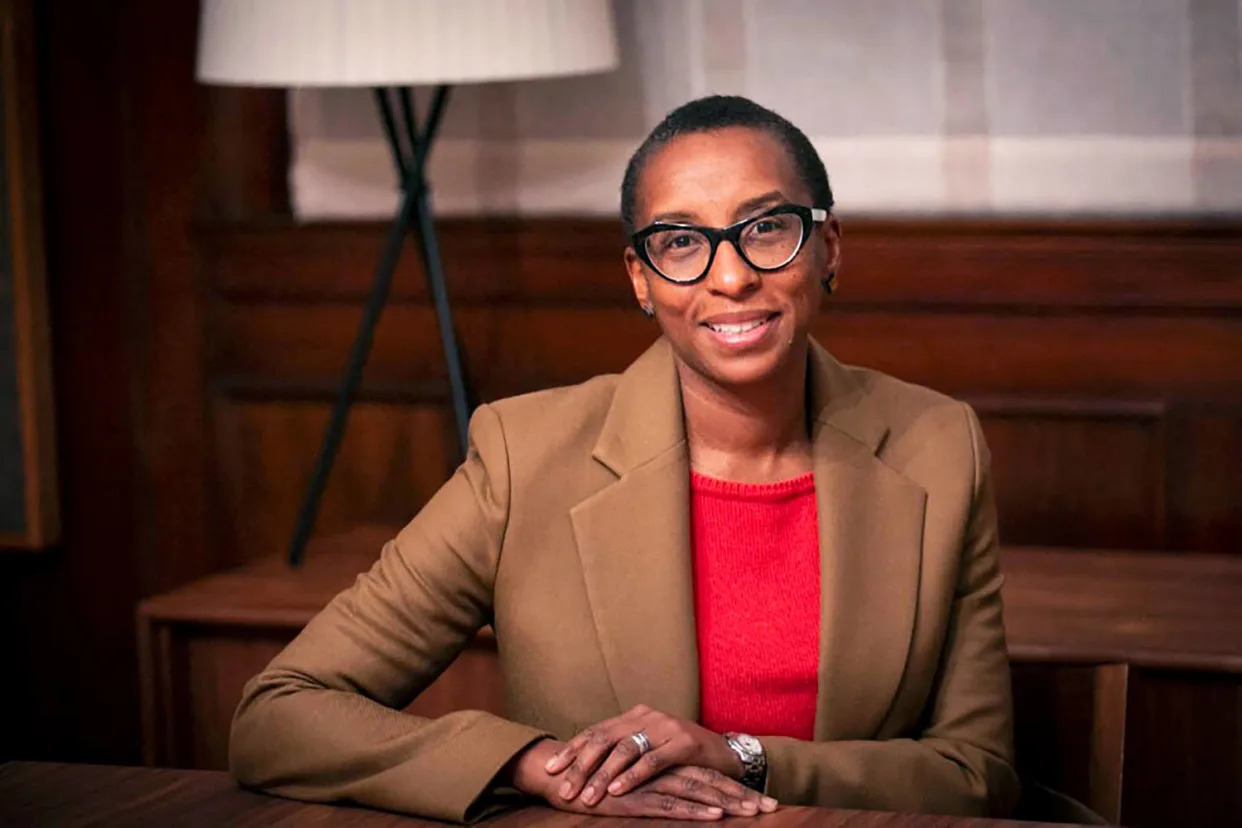
Eden Getahun was ecstatic when, just 13 months ago, she learned Harvard University would have its first Black female president. But she sensed even then that Claudine Gay, a prominent African American studies scholar, would face harsh obstacles leading the predominantly white institution.
There was “excitement and hope in terms of what it represents for Black women everywhere to see someone like them in a position of authority like this,” said Getahun, a Black woman and a junior studying social studies at Harvard. “But I did, from the very beginning, recognize there is a chance that she is just going to be used as a puppet of the institution. This situation has proven she still is a victim of these controlling forces.”
Gay resigned as president of the university Tuesday after she faced backlash for her testimony at a congressional hearing last month about antisemitism on U.S. campuses, which was followed by allegations of plagiarism. The charge was largely led by conservative activists who deemed her a “diversity hire.”
The Harvard Corporation, which oversees the university’s governance, has not yet responded to a request for comment. In a statement issued Tuesday, the corporation said it had accepted Gay’s resignation “with sorrow” and condemned the “repugnant and in some cases racist vitriol directed at her through disgraceful emails and phone calls.”
For Black women in the Harvard community like Getahun and Aimee Howard, both part of the Association of Black Harvard Women, the situation is a “disappointing” reminder of the ways Black women are undermined and scrutinized no matter how high up the ranks they climb.
“It’s really heart-wrenching,” Howard, a Harvard junior government and African American studies major, said of Gay’s resignation. “It’s very telling that this type of scrutiny, this type of backlash,” was aimed at the university’s “first Black woman president. I feel like Claudine Gay is becoming the scapegoat for everything.”
Pressure for Gay’s resignation mounted after last month’s hearing, when she appeared to avoid questions about whether calls for the genocide of Jews violated college conduct rules. Gay, alongside Liz Magill, then the president of the University of Pennsylvania, and Sally Kornbluth, the president of the Massachusetts Institute of Technology, condemned antisemitism and Islamophobia in broad terms. But when they were asked whether calls for the genocide of Jews would break college codes of conduct, Gay said “it depends on the context” and added that antisemitic rhetoric would be considered “bullying, harassment, intimidation.”
The comments were widely condemned, including by the White House. Magill resigned days after the hearing, and Kornbluth is facing increasing calls to step down. While Kornbluth initially faced less ire, activists are signaling their attention will turn to her now that Gay has stepped down.
Right-wing attacks on Gay were swift, with conservative activists like Christopher Rufo and billionaire investor Bill Ackman using the situation and allegations of plagiarism to attack diversity, equity and inclusion initiatives. Getahun and Howard said they did not feel Harvard did enough to protect Gay from the targeted right-wing attacks.
The campaign against Gay has only shown “the intense standard” that Black women are held to, Getahun said. “As you get higher up, it doesn’t afford you more safety but makes you more subject to that scrutiny. If it had been a white male in her position, as you get higher up, you’re afforded more impunity.”
Last month, more than 700 members of Harvard’s faculty signed a letter urging the administration to keep Gay. And it looked like the university would. On Dec. 12, the Harvard Corporation announced it would allow Gay to remain in her role, saying in a statement that “we today reaffirm our support for President Gay’s continued leadership of Harvard University.” The corporation addressed allegations of plagiarism, saying an investigation “revealed a few instances of inadequate citation” but no violation of Harvard’s standards for research misconduct.
Gay acknowledged the attribution issues in her past work and said she requested corrections for the articles in the appropriate academic journals.
Gay decried the “racial stereotypes” used to attack her in a New York Times op-ed published after her resignation Wednesday and wrote that she regretted not having condemned calls for a genocide of Jewish people as “abhorrent and unacceptable.” She did, however, defend her research in the op-ed and expand on the circumstances surrounding her resignation.
“It is not lost on me that I make an ideal canvas for projecting every anxiety about the generational and demographic changes unfolding on American campuses: a Black woman selected to lead a storied institution,” Gay wrote. “Someone who views diversity as a source of institutional strength and dynamism. … Someone who believes that a daughter of Haitian immigrants has something to offer to the nation’s oldest university.”
Both Black and non-Black leaders and supporters have shared similar sentiments, linking the scandal to anti-Blackness, white supremacy and right-wing attacks on education.
Kyla Golding, a Black Harvard senior, wrote in an op-ed in the student newspaper, The Harvard Crimson, that “at the mountaintop for the Black woman, there is no promised land. No liberation, no forgiveness, no love, no protection.”
“As if surviving the cruel cold misogynoir of the world while simultaneously being burned by the heat emanating through the intensified pressure Black women constantly face isn’t enough to conquer; the higher up she goes the thinner the altitude gets,” Golding wrote.
Harvard President Warns Of A ‘Broader War’ Against ‘Pillars Of American Society’
Sanjana Karanth
Thu, January 4, 2024
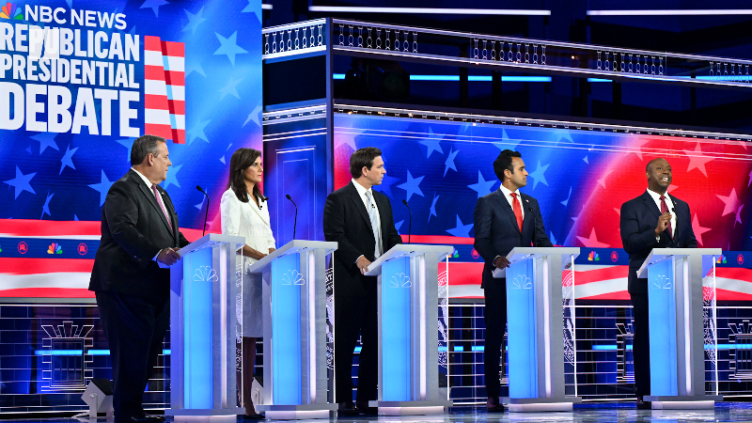
Claudine Gay ― the Harvard University president who announced her resignation this week amid a right-wing campaign accusing her of antisemitism and plagiarism ― said Thursday that her ouster is part of a “broader war” to undermine public faith in the “pillars of American society” like academia.
Gay, who was Harvard’s first Black president and also serves as a professor of government and African American studies, penned an op-ed in The New York Times two days after she sent a letter to the Harvard community announcing she would step down as president and remain part of the faculty.
“For weeks, both I and the institution to which I’ve devoted my professional life have been under attack,” she wrote in the Times. “My character and intelligence have been impugned. My commitment to fighting antisemitism has been questioned. My inbox has been flooded with invective, including death threats. I’ve been called the N-word more times than I care to count.”
“My hope is that by stepping down I will deny demagogues the opportunity to further weaponize my presidency in their campaign to undermine the ideals animating Harvard since its founding: excellence, openness, independence, truth,” she continued.

Claudine Gay of Harvard University testifies before the House education and workforce committee on Dec. 5 in Washington, D.C.
Claudine Gay of Harvard University testifies before the House education and workforce committee on Dec. 5 in Washington, D.C.
Gay’s resignation came after weeks of pressure on the university to punish the president for not directly answering a question from Rep. Elise Stefanik (R-N.Y.) about whether calls on campus for the genocide of Jewish students ― or even the use of controversial pro-Palestinian expressions like “From the river to the sea, Palestine will be free” ― would violate Harvard’s rules.
Gay, along with two other university presidents, said in a congressional hearing that the acceptability of any on-campus speech regarding the violence in Gaza would depend on the context. The remarks by the various presidents drew an immediate firestorm of criticism.
In her op-ed, Gay acknowledged that she has “made mistakes,” citing her initial response to the Oct. 7 attack by Hamas militants against Israel. She wrote that during the congressional hearing, she should have condemned antisemitic behavior more forcefully. The Harvard Corporation, the school’s governing board, supported Gay during the controversy by saying she was defending the university’s academic freedom.
More recently, Gay ― who was president for less than a year ― came under fire after right-wing voices accused her of plagiarizing other scholars in her own peer-reviewed academic writings on the significance of people from marginalized communities holding office in American politics.
According to Gay, her research found that “when historically marginalized communities gain a meaningful voice in the halls of power, it signals an open door where before many saw only barriers,” resulting in a strengthened democracy.
Harvard acknowledged some instances of inadequate citation in Gay’s work, but said that she quickly corrected them. Gay said the process of correcting duplications was “consistent with how I have seen similar faculty cases handled at Harvard.”
“I have never misrepresented my research findings, nor have I ever claimed credit for the research of others,” she wrote on Thursday. “Moreover, the citation errors should not obscure a fundamental truth: I proudly stand by my work and its impact on the field.”
The resignation makes Gay’s tenure the shortest of any Harvard president, and comes at a time when academic institutions increasingly face threats of censorship from mostly right-wing figures who seek to stifle speech from people who come from marginalized backgrounds.
“It is not lost on me that I make an ideal canvas for projecting every anxiety about the generational and demographic changes unfolding on American campuses: a Black woman selected to lead a storied institution,” Gay wrote. She urged the public to be “more skeptical than ever of the loudest and most extreme voices in our culture.”
The outgoing president also said that the campaign to push her out of her role was “merely a single skirmish in a broader war to unravel public faith in pillars of American society.”
“Campaigns of this kind often start with attacks on education and expertise, because these are the tools that best equip communities to see through propaganda,” she wrote. “But such campaigns don’t end there. Trusted institutions of all types ― from public health agencies to news organizations ― will continue to fall victim to coordinated attempts to undermine their legitimacy and ruin their leaders’ credibility.”
You can read Gay’s full op-ed here.
Related...
Harvard President Claudine Gay Announces She Will Resign
Plagiarism Charges Downed Harvard’s President. A Conservative Attack Helped To Fan The Outrage
Hundreds Of Harvard Faculty Defend President After Backlash Over Antisemitism
Column: The truth about the Harvard president's ouster
Michael Hiltzik
Thu, January 4, 2024

Florida's Republican Gov. Ron DeSantis, left, and right-wing activist Christopher Rufo celebrate DeSantis' anti-"woke" agenda for his state's public universities. (Daniel A. Varela / Associated Press)
You may have heard during the last few days about the resignation by the president of a smallish university in New England.
Pundits, politicians and alumni are currently locked in a debate over whether Claudine Gay's decision to step down after only a months-long tenure as president of Harvard was due to accusations that she was a serial plagiarist or her maladroit performance last month at a congressional hearing about a surge of antisemitism on American college campuses.
A few things about this: That some of Gay's academic writings crossed the line into plagiarism is indisputable. That she, along with the presidents of the University of Pennsylvania and MIT, failed to knock the "gotcha" questions about antisemitism back down the throats of the cynical, preening Republican interrogators at the hearing is also indisputable.
The biggest story about higher education over the last decade has been increased politicization, not wokeness.Don Moynihan, Georgetown University
What's important is that neither of those facts has anything to do with what was really behind the campaign to force Gay out of her job. To put it simply, the press has completely missed the real story. To be precise, the debate about her resignation has ignored the noxious context, which is a concerted attack on American higher education — indeed, all education — by a right-wing cabal.
Gay, whatever her faults, is clear-eyed about this context. In an op-ed published Wednesday, she warned that her case "was merely a single skirmish in a broader war to unravel public faith in pillars of American society."
Such campaigns, she added, "often start with attacks on education and expertise, because these are the tools that best equip communities to see through propaganda. ... Trusted institutions of all types — from public health agencies to news organizations — will continue to fall victim to coordinated attempts to undermine their legitimacy and ruin their leaders’ credibility. For the opportunists driving cynicism about our institutions, no single victory or toppled leader exhausts their zeal."
What's most shocking about the failure of the press to recognize what's happening is that the leaders of the cabal are completely open about their goals and their methods. Here, for instance, is a manifesto by the odious Christopher F. Rufo, the leader of the braying mob that chased after Gay:
"We launched the Claudine Gay plagiarism story from the Right," he stated on X-formerly-Twitter on Dec. 19. "The next step is to smuggle it into the media apparatus of the Left, legitimizing the narrative to center-left actors who have the power to topple her. Then squeeze." This is a replication of his campaigns to turn "critical race theory" (CRT) and "diversity, equity and inclusion" programs (DEI) into dog whistles for the reactionary Republican voting bloc.
Read more: Column: A bogus new attack on COVID vaccines from Texas' least credible politician
The problem is that all the focus is on Harvard, for at least a couple of reasons: It's the most prestigious university in the country and lots of journalists at agenda-setting news organizations such as the New York Times are alumni, and thus believe that culture and society revolve around the place (or similar Ivy League institutions).
"The obsessive culture war coverage of the Ivies hurts other institutions," observes Don Moynihan, a public policy professor at Georgetown University. Those elite private schools have the money and connections to survive whatever partisan politics throws at them.
Not so the public institutions that educate the vast majority of Americans. (Harvard's enrollment, including its graduate and professional schools, is about 30,000; at Florida's three main campuses, which are under intense partisan threat from Gov. Ron DeSantis, it's a combined 185,000.)
"The biggest story about higher education over the last decade has been increased politicization, not wokeness," Moynihan writes. "The biggest threats to speech are coming from people who write the laws and set the budgets, not from students. ... University trustees in public institutions are increasingly political appointees determined to impose right wing values."
He's right. Yet coverage of the crisis in public schools pales in comparison to the obsessive reportage about Harvard and the Ivies.
The model for eviscerating the independence of public university systems was set by Republican Gov. Scott Walker of Wisconsin. By the end of his two terms in 2019, reported Karin Fischer of the Chronicle of Higher Education in 2022, "Walker had slashed college budgets, stripped tenure protections and university autonomy, and proposed gutting the Wisconsin Idea, enshrined in state law, that stresses higher education’s importance to the state and society."
According to Barrett J. Taylor, the author of "Wrecked: Deinstitutionalization and Partial Defenses in State Higher Education Policy," a book about the Wisconsin experience, “Walker went after higher ed to rally his base: ‘Universities were too liberal! Professors had too good of a deal!’ It was something to oppose. And higher ed is still a useful political tool.”
Read more: Column: Not satisfied with schools, book banners are now targeting adults' right to read
Other state universities were targeted by partisan activists. The University of North Carolina was bedeviled by conservatives on its Board of Governors claiming to find ideological bias campuswide. The board's real agenda was to shut down progressive activities, which it did by closing a poverty law center at the main campus at Chapel Hill led by "a vocal critic of conservatives," according to Inside Higher Ed, as well as an environmental science program and a center on social change at satellite campuses.
In December, Kevin Guskiewicz left his job as chancellor of UNC Chapel Hill to become president of Michigan State University. The mostly Republican board replaced him with Lee Roberts, a Republican functionary who had no experience running a major university.
At Texas A&M, conservatives influential within the university system interfered with the hiring of a distinguished journalist, Kathleen McElroy, to head its journalism school.
Over a period of weeks, the terms of her employment were reduced to a one-year non-tenured appointment from a tenured chair. The reason, McElroy was told by the university's dean of arts and sciences, was that "you're a Black woman who worked at The New York Times."
The fiasco led to the resignation of A&M President Katherine Banks after a faculty meeting in which she defended the fiasco clumsily. McElroy chose to stay at the University of Texas and obtained a $1-million settlement from A&M over the altered offer.
Florida remains ground zero of the reactionary attack on public higher education. DeSantis has installed Ben Sasse, a former Republican senator from Nebraska, as president of the flagship University of Florida (enrollment: 60, 795); never mind that Sasse had zero experience running a major university.
Read more: Column: The right-wing campaign to make our kids dumber
The highlight (or lowlight) of DeSantis' campaign against Florida universities involves New College of Florida, a Sarasota institution that possessed a well-deserved reputation as one of the nation’s outstanding havens for talented, independent-minded students. DeSantis fired its board of trustees and replaced it with a clutch of right-wing stooges including Rufo.
They promptly fired the college's president and replaced her with Richard Corcoran, a former GOP state legislator, while nearly doubling his salary to $700,000, plus more than $200,000 in perks.
Corcoran moved to turn New College into a fourth-tier institution of zero distinction. He recruited 70 baseball players even though the campus has no playing fields. Existing students fled, and the average SAT and ACT scores and high-school grade point averages of the incoming class have plummeted.
That brings us back to Rufo and his campaign against Claudine Gay. Does any person past the age of playing with their toes really believe that he cares one whit about plagiarism and antisemitism, the ostensible rationales for her departure? Does anyone believe his purpose is to heighten the integrity of prose in academia, or ensure that university campuses remain refuges for pro-Israel policy?
Of course he doesn't — at least not beyond using these issues to conceal his real goal, which is to make university administrators and faculty terrified of being caught allowing progressive thoughts into the classroom.
Here he was on Twitter, on March 15, 2021, at the height of his fabricated campaign against "critical race theory," which became conveniently truncated as "CRT," the better to put it over on rubes without explaining what it is:
"We have successfully frozen their brand — 'critical race theory' — into the public conversation and are steadily driving up negative perceptions. We will eventually turn it toxic, as we put all of the various cultural insanities under that brand category."
"Brand category," "negative perceptions." ... This is the language of advertising, not serious political discussion.
Having achieved his purpose by demonizing CRT, Rufo and his sycophants turned to DEI. Right-wing politicos unwilling or unable to even feign interest in making public policy scurried to get in front of this parade.
Read more: Column: Red-state efforts to dumb down their universities will provoke a brain drain
GOP legislators in Wisconsin held hostage $800 million in funding for the state university and blocked all staff pay raises unless the university cut back DEI programs. The university agreed. Oklahoma's Republican governor, Kevin Stitt, signed an order defunding DEI departments in all state agencies, including the state's 50 public university campuses.
Did anyone stop to inquire what it means to reverse DEI? The antonyms of diversity, equity and inclusion are uniformity, inequality and exclusion. In context, this translates into white supremacy. For who is on the outside looking in when the rules promote uniformity, inequality and exclusion? In our society, it's everyone but whites — especially white males.
Of course, once you've reduced these principles to "DEI," no one has to stop and think about meaning. But it's no secret to those on the firing line. The assault on DEI programs, observed a report on Florida's anti-DEI campaign by the American Assn. of University Professors, is "emblematic of how civil rights discourses get co-opted by the far right to promote misogynistic (and/or racist) agendas."
Gay's sloppiness in citing others' words in her academic oeuvre was a dormant bomb, awaiting someone looking for a flaw in her record to light the fuse. That doesn't mean that it fails to qualify as plagiarism; it does, according to Harvard's own written standards.
Nor does it mean that her offenses would have necessarily prompted her resignation, if not for the miasma of ideological controversy stirred up by Rufo and his detestable henchwoman, Rep. Elise Stefanik (R-N.Y.).
It was Stefanik who set the rhetorical trap that Gay stupidly walked into at that Capitol Hill hearing, along with Penn President Liz Magill (who has also resigned, more directly as a result of a campus controversy over antisemitism) and MIT President Sally Kornbluth (who still has her job).
The sad truth is that plagiarism standards are dynamic, with punishment dependent on the prestige of the accused and the willingness of an institution to stand by them. As Timothy Noah of the New Republic has pointed out, Harvard faculty member Doris Kearns Goodwin committed arguably more egregious examples of plagiarism in 2002 and emerged with her employment and reputation intact, with Harvard's help.
Rufo and Stefanik are taking victory laps over Gay's resignation. Stefanik, who never lets an opportunity slip by to display crass vulgarity, tweeted "Two Down," referring to Gay and Magill. Perhaps this incident will open people's eyes to the dishonesty of their campaign and the hollowness of their triumph. Wouldn't that be justice?
Get the latest from Michael Hiltzik
This story originally appeared in Los Angeles Times.
Al Sharpton says ousted Harvard chief was ‘scapegoat’ in fight against diversity
Gloria Oladipo
Thu, January 4, 2024 at 2:36 PM MST·4 min read
598

Photograph: Frank Franklin II/AP
The civil rights leader the Rev Al Sharpton hosted a protest outside the office of the Harvard alumnus Bill Ackman on Thursday after Ackman criticized diversity, equity and inclusion initiatives at Harvard following the resignation of the former university president Claudine Gay.
“[Ackman] declared war on DEI. He declared war on affirmative action. He’s defining himself as a rightwinger in terms of dealing with racial equality,” Sharpton told the Guardian during the protest alongside his organization, National Action Network, outside Ackman’s office in New York City.
Related: Ousted Harvard president Claudine Gay warns of ‘a broader war’ in op-ed
The group has vowed to protest outside the building every Thursday in light of Ackman’s comments with plans to “escalate”, Sharpton told the Guardian.
“This issue is not just about what they did to this president of Harvard University. It’s about the use [of her] as a scapegoat to fight DEI,” Sharpton said at Thursday’s action, adding that Gay was the first Black person to lead Harvard.
The protest comes after Ackman, who largely led a campaign to remove Gay as Harvard president, criticized DEI programs this week in a 4,000-word social media post on X, formerly known as Twitter.
Ackman criticized DEI programs as apart of a “racist and illegal movement”.
“DEI is inherently a racist and illegal movement in its implementation even if it purports to work on behalf of the so-called oppressed,” Ackman wrote, adding that such programs create a “an oppressor/oppressed framework” and stir up “anti-Israel and anti-Jewish hate speech and harassment” on campus.
Sharpton told the Guardian that he had not spoken with Gay directly, but emphasized that Thursday’s protest was about countering attacks on DEI.
“They [have] said that this will now be the first step in their fight against diversity, equity and inclusion,” Sharpton said. “Since they want to make it a fight, we’ve come to their office to let them know that we’re prepared to fight,” he added.
Sharpton was also joined by the New York City comptroller, Brad Lander, who is Jewish. Lander criticized Ackman’s remarks as antithetical to addressing antisemitism.
“What I know for certain is that the way we will defeat antisemitism is by joining together in struggle with leaders for diversity and inclusion,” Lander said.
Sharpton, Lander and a small crowd circled in front of Ackman’s office, while chanting and holding signs expressing support for DEI programs.
Protesters shouted: “When DEI is under attack, what do we do? Stand up, fight back!”
Demonstrators also held green, red and black signs reading: “This is good trouble,” referencing a quote from the late congressman and civil rights leader John Lewis.
Other signs criticized Ackman directly. Yetunde Babajide, a Columbia University student from New York’s Upper West Side, brought a homemade sign written on the lid of a storage container, reading: “Ackman has stepped on the wrong one.”
“What I’ve seen in this country, in this case, scares the hell out of me, especially when it comes to DEI,” Babajide said.
“This is totally uncalled for. This is totally unacceptable and the people behind this must be exposed,” she added.
Smith Georges, a 67-year-old retired paralegal and community leader based on the Upper West Side, said he wanted to protest in support of Gay as a fellow Haitian American.
“The community, the extreme right, people like Ackman just plotted to bring her down,” Georges said.
“When they’re trying to attack us like this, we have to stand firm and continue to fight,” he added.
Ackman’s latest comments came after Gay stepped down from her position as Harvard’s president on Tuesday. Gay faced intense pressure over her response to alleged antisemitism at Harvard and accusations that she plagiarized during her academic career.
Criticisms of Gay intensified after 5 December, when she and other university presidents testified in front of Congress about their handlings of alleged on-campus antisemitism following the 7 October attack in Israel.
Conservatives, including those who have criticized DEI efforts, quickly called for Gay to be ousted as president. More than 70 US legislators also signed a letter calling for Gay’s removal.
In her resignation letter, Gay criticized the racist critiques she faced amid the campaign to remove her.
“[It] has been distressing to have doubt cast on my commitments to confronting hate and to upholding scholarly rigor – two bedrock values that are fundamental to who I am – and frightening to be subjected to personal attacks and threats fueled by racial animus,” Gay wrote.
Rev. Sharpton Leads Protest at Bill Ackman's Office After Harvard President Resigns
Storyful
Thu, January 4, 2024
Reverend Al Sharpton led a protest outside billionaire investor Bill Ackman’s office in Midtown Manhattan on Thursday, January 4, days after Harvard President Claudine Gay resigned over allegations of plagiarism.
Ackman was a high profile critic of Gay, Harvard’s first Black president, over her handling of antisemitism on campus and was part of a campaign calling for her resignation.
Sharpton marched with the National Action Network on Thursday outside the office of Pershing Square Capital Management, the hedge fund founded by Ackman, with protesters chanting, “No justice, no peace.”
In a statement ahead of the protest, Sharpton said Ackman’s “relentless campaign” for President Gay’s resignation was “an attack on every Black woman in this country who’s put a crack in the glass ceiling.” Credit: @datainput via Storyful
Video Transcript
- Justice.
- When do we want it?
- Now.
- What do we want?
- Justice.
- When do we want it?
- Now.
- It we don't get it.
- Shut it down.
- If we don't get it.
- Shut it down.
- If we don't get it.
- Shut it down.
- No justice.
- No peace.
- No justice.
- No peace.
- No justice.
- No peace.
- No justice.
- No peace.
- No justice.
- No peace.
- No justice.
- No peace.
- No justice.
- No peace.
- What do we want?
- Justice.
- When do we want it?
- Justice.
- When do we want it?
- Now.
- When do we want it?
- Now.
- When do we want it?
- Now.
- No justice.
- No peace.
- No justice.
- No peace.
- No justice.
- No peace.
- No justice.
- No peace.
- No justice.
- No peace.
- No justice.
- No peace.
- Please. Do you, who've been leading, try to get all of us to leave--
- What we will not--
[INTERPOSING VOICES]
- She never led, one time. We got read and we got justice. Called me right off the bat, something on.
- Justice.
- No peace.
- No justice.
- No peace.
- When DEI is under attack, what do we do?
- Stand up and fight back.
- What do we do?
- Stand up and fight back.
- When DEI is under attack, what do we do?
- Stand up, fight back.
- What do we do?
- Stand up, fight back.
- I can't hear you. What do we do?
- Stand up and fight back.
- When DEI is under attack, what do we do?
- Stand up and fight back.
- What do we do?
- Stand up, fight back.
- No justice.
- No peace.
- No justice.
- No peace.
- No justice.
- No peace.
- When DEI is under attack, what do we do?
- Stand up and fight back.
- What do we do?
- Stand up and fight back.
- I can't hear you. What do we do?
- Stand up and fight back.
- When DEI is under attack, what do we do?
- Stand up and fight back.
- What do we do?
- Stand up and fight back.
- When DEI is under attack, what do we do?
- Stand up and fight back.
- What do we do?
- Stand up and fight back.
- I can't hear you. What do we do?
- Got to stand up, fight back.
- Here.
- What do we do?
- Stand up, fight back.
- No justice.
- No peace.
- No justice.
- No peace.
- Why do we march, no justice.
- No peace.
- And when walking, no justice.
- No peace.
- We come to the DEI and--
- Here's Al Sharpton with both people.
- Stand up, fight back.
- All right now, how important is it.
- Don't you worry, the people's right.
- All we want, break-through scenes, that's all.
- We would not have to have DEI if we didn't have D-E-N-Y.
- No justice.
- No peace.
- We were denied. DEI was to make up for the denial historically of Blacks, of women, of gays, of Latinos, and Asians. And since this man decided that he would stand up and say that taking out Dr. Gay is the beginning of taking out DEI, I want to come to his office and let him know that we will fight him.
We said nothing when the fight was at Harvard. But now he's declared war against all of us. DEI is something we must have to equalize the playing field. And that's why we're here today.
- No justice.
- No peace.
- No justice.
- No peace.
- The DEI was nothing against what happened on October 7th. This is not about anti-Semitism. So why are you now making it about hatred by coming at DEI?

